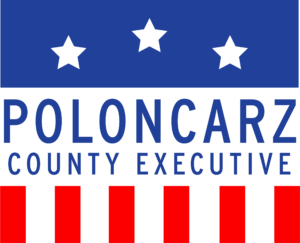By Robert J. McCarthy
Erie County’s routine borrowing procedures are suddenly dominating the campaign for county executive after Republican incumbent Chris Collins on Tuesday accused Democratic opponent Mark C. Poloncarz of “incompetence” and struggling with “basic math.”
Collins initiated the latest flare-up when his campaign said Poloncarz, the county comptroller, bypassed the county financial control board while planning for a short-term revenue note—a move Collins said could cost taxpayers between $600,000 and $900,000 in interest payments.
“Mark Poloncarz continues to hurt taxpayers through his incompetence and his petty politics,” said Collins spokesman Stefan Mychajliw. “Poloncarz’s inability to be able to provide real savings clearly demonstrates that he is not competent enough to properly manage Erie County, a $1 billion operation.”
Poloncarz denied any missteps in obtaining what was originally proposed as an $80 million short-term loan, accusing his opponent of “jumping the gun” and whipping a yet-to-be- completed process into a political firestorm. He said he has every intention of considering potentially lower interest rates through the control board — but only after comparing all rates available through regular channels.
“This is just a cheap shot,” the comptroller said. “It’s quite clear Mr. Mychajliw and the others don’t even know what they’re talking about when they’re dealing with underwriters and Wall Street entities.”
The latest brouhaha in an escalating contest for county executive centers around Collins’ request for legislation to allow the control board to borrow $80 million for short-term cash as part of the county’s annual cash-flow management. Collins also declared an immediate need for the action, prompting involvement of the control board to manage the bond sale.
But when the Legislature failed to approve the county executive’s request at its July 21 meeting, the Collins campaign said it was reacting to unnecessary warnings from Poloncarz. The net effect, the campaign said, is that taxpayers face potentially higher borrowing costs as a result of bypassing more advantageous interest rates available to the control board.
Mychajliw also hinted that Poloncarz was angling for political donations.
“Maybe it’s because he wants to be the one to access the financial markets—and the tens of thousands of dollars that come along with that access in campaign contributions,” he said.
But Poloncarz also raised the issue of financial ignorance on the part of the Collins campaign, noting that the Securities and Exchange Commission prohibits Wall Street firms with which he does business from contributing to his campaign.
The comptroller reiterated that he does not anticipate the need for the Legislature to act on the borrowing until its next meeting Sept. 8, since the county has enough cash on hand to possibly carry it into October due to higher-than-anticipated sales tax revenue. By then, he said, he will have obtained information on interest rates from a variety of lending sources to compare against the control board’s.
In a July 28 letter to the Legislature, Poloncarz said the fact that Collins never contacted him about declaring an immediate need for borrowing and thereby involving the control board suggested the county executive had “no intention” of allowing the county to borrow on its own, regardless of which entity had the best interest rates.
